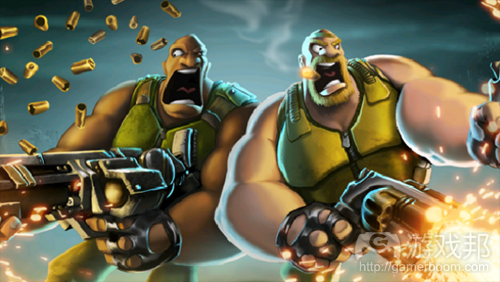Niccolo de Masi称跨平台体验是移动行业的未来
作者:Neil Long
从《Snake》到《Song Pop》时代,Glu公司已经在手机游戏领域捉摸滚打了11个年头。但甚至在iPhone给这家公司提供了广阔的新市场之后,Glu公司还是陷入了严重的危机之中。那时,Niccolo de Masi还没现身。这位于2010年初上任的董事长兼CEO坦言:“我们的公司在一年之内就近乎耗尽所有资金了。前任的收购活动太多太冒进,用光了首次公开募股的资金。可是这些举动没有成效。”
有些受访者口若悬河地说了很多,但有意义的话却很少——Niccolo de Masi则相反,他讲述了Glu公司之前的管理体制的长期弊端,当苹果App Store繁荣发展之际,公司却犹豫不决、不知所措。Glu公司甚至考虑彻底退出手机游戏市场,一头扎进网页游戏中——因为2008年和2009年分别崛起了Zynga和PlayFish。
直到de Masi的到来和重整计划的出台,一切才有了转机。“我们赌上了未来,朝着免费模式、原创、智能手机和平板电脑领域出发。”主机风格的《Gun Bros》是一款免费手机社交游戏,于2010年十月发行,宣告新Glu的诞生。今天,该公司的市值是de Masi刚加入之时的10倍。
de Masi解释道:“公司在手机游戏方面犯的一个最大的错误是,没有尽快地从旧业务中全身而退——诺基亚也栽在相同的坎上,很大程度上,EA也未能幸免。EA在从主机向数字游戏的转变中面临着相同的挑战。诺基亚和RIM也一样,总是太热敏于旧事物。”
忘记现在发生的事。苹果为iOS设备的战略部署正在塑造手机游戏的未来。de Masi分析道:“在硬件、软件和商店的纵向一体化管理方面,它创造了奇迹。iTunes才是我们发行和推广游戏的好去处。谷歌和微软等公司跟风苹果iPad,分别推出自己的平板设备Nexus 7和Surface。三星则竭尽全力,将手机和平板电脑的屏幕品质提升到电视和笔记本的档次,基本上做的也是相同的事。索尼?也不例外。我认为,过半的大公司走的都是相同的道路。”
最终,大公司不会给新一代社交手机平台留下任何余地。“事实上,我认为Gree和DeNA等公司的价值定位没有获胜的希望。苹果、谷歌、微软和亚马逊才是将赢得开发大战和平台大战的公司。基本上,我认为内容才是吸引受众的关键——平台并不会驱使受众。”
“Gree和DeNA在打造的是不同的平台,这是跟苹果对着干。苹果想让你用Game Center,如果你用其他平台,他们就不会用你的游戏。
“总有一天,心怀Google+抱负的谷歌可能会做一些相同的事。谁能问鼎这场持久战?有硬件者赢未来。”
尽管de Masi的改革迅速又彻底,但Glu还是保留了一些旧的移动业务:它向多重设备移植产品的技术。苹果、谷歌、微软、三星、亚马逊和索尼可以建立完整的生态系统占据市场,从而使市场越来越分裂,de Masi认为多设备移植是应对这种市场的无价之宝。但是,刚刚提到的大公司还少了一家。任天堂会怎么样呢?
de Masi指出:“到2014年或2015年,如果多屏幕游戏电视、笔记本、台式机、智能手机和平板技术彼此没有相互衔接,那我会感到很惊讶。任天堂现在遇上麻烦了,是因为它的掌机生意正在衰退。现在得势的是平板电脑和手机。”
“为了分化市场,他们必须打造越来越小众和高端的主机游戏体验。但是,新的数字推广商店和免费商业模式已经把所有其他游戏体验开发尽了。”
De Masi直接的论断和激进的比喻——破釜沉舟和倾其所有,这种大胆的结论是很难从游戏行业的CEO口中听到的。Glu等采取多种战略的公司可能意味着我们必须重新估我们所谓的“移动”这一概念。在De Masi所设想的未来中,“移动”意味着在多种设备中,而不只是在智能手机上玩游戏。(本文为游戏邦/gamerboom.com编译,拒绝任何不保留版权的转载,如需转载请联系:游戏邦)
Back from the brink: how a new CEO saved Glu Mobile
by Neil Long
From Snake through to Song Pop, Glu has been in the mobile game business for 11 years. But even after iPhone gave the company a huge new market, Glu was in serious trouble before Niccolo de Masi was appointed president and CEO in early 2010. “We were a company that was going to run out of money inside a year,” he tells us. “My predecessor made a number of big, bold acquisitions that used up all of the IPO cash. And those didn’t work out.”
Some interviewees talk a lot, but ultimately say nothing – de Masi is not one of those people. He describes chronic indecision in Glu’s previous regime, “Ummming and ahhhing” over which direction to take as the App Store boom happened all around them. Glu even considered a retreat from mobile altogether to go web-first following the rise and rise of Zynga and PlayFish in 2008 and 2009.
That changed with de Masi’s arrival and turnaround plan. “We bet all of our chips on the future which is freemium, original IP, smartphones and tablets,” he tells us. Gun Bros, a free-to-play mobile social game with a console-style gloss released in October 2010, was a statement of intent from the ‘new Glu’. Today, the company’s market cap is almost ten times what it was when de Masi joined.
“The number one mistake that companies in mobile make – and this is true for Nokia, and in a lot of ways for companies like EA – [is that] they don’t burn their bridges fast enough from the legacy business,” de Masi says. “EA has the same challenge in the console transition to digital. With Nokia and RIM it’s the same – people always cling to the old thing [for] too long.”
Forget what’s happening right now. The future of mobile games, as de Masi sees it, is being shaped by what Apple has done with its suite of iOS devices. “It has created a shining light of vertical integration between hardware, software and storefront,” he tells us. “iTunes is a more efficient place to build and distribute our games. You’re seeing companies like Google and Microsoft take pages out of Apple’s playbook with devices like Nexus 7 and Surface. Samsung does everything from making TV screens and laptops to phones and tablets and they’ll do the same thing. Sony? Same thing. I think at the end of the day you’re going to see half a dozen big companies.”
And ultimately this doesn’t leave any place for the new generation of social mobile platforms, he tells us. “I actually think that companies like Gree and DeNA don’t have a winning value proposition. The Apples and Googles and Microsofts and Amazons are the companies that are going to win the developer relations battle and the platform battle. Fundamentally I think content is what drives audience – platforms don’t drive audience.
“What Gree and DeNA are doing is a different type of platform and it is competitive with what Apple are doing. Apple wants you to use Game Center and they won’t feature your games if you use something else instead.
“Someday, Google, which has Google+ ambitions, will probably do something along those lines. Who’s going to win the battle in the long run? The guys that own the hardware in the first place.”
Though de Masi’s transformation was swift and unforgiving, Glu retained one remnant of the old mobile business: its expertise in porting its products to multiple devices. De Masi sees this as invaluable in addressing what will be an increasingly fragmented market, dominated by the complete ecosystems that the likes of Apple, Google, Samsung, Microsoft, Amazon and Sony could build. But there’s one big name missing from this list. What about Nintendo?
“By 2014/2015 I would be surprised if we don’t have connected experiences from all of the big technology companies which have multi-screen play – TV, desktop, laptop, smartphone and tablet,” he says. “Nintendo is in trouble because its handheld business is going away. That’s going to tablets and phones.
“To differentiate they have to build more and more niche and high-end console experiences. All other gaming experiences are being cannibalised by the new digital distribution stores and the freemium business model.”
Ouch. De Masi’s straight talking and risky rhetoric – of burning bridges and betting all the chips – is the sort you rarely hear from CEOs in the games business. Glu and companies like it going multi-format might mean we have to re-evaluate what we mean by ‘mobile’. In de Masi’s future, it means mobile between devices, not just played on a smartphone.(source:edge-online)
上一篇:论述销售数字商品的5点注意事项








































 闽公网安备35020302001549号
闽公网安备35020302001549号